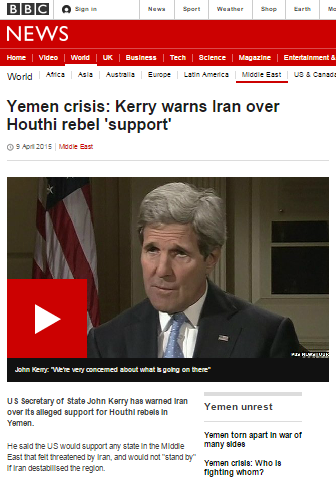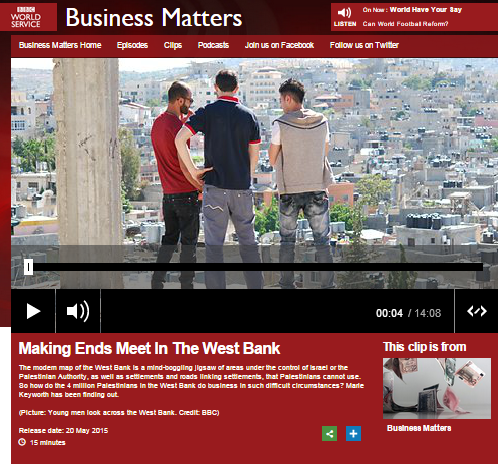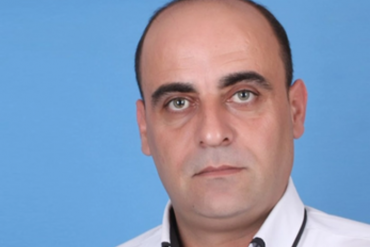As already noted, a significant proportion of the January 18th edition of BBC Radio 4’s ‘Today’ programme was again given over to the topic of the Gaza Strip.
The previous evening viewers of ‘News at Ten’ had seen Mishal Husain’s one-sided report on the healthcare system in the Gaza Strip – filmed a month earlier when she visited the territory – and the next morning Radio 4 listeners heard her present a total of over sixteen and a half minutes of similar content in two separate items, the second of which (from 2:09:59 here) included an interview with the Israeli ambassador to the UK and the recycling of an interview with an UNRWA official.
The first part of Husain’s introduction was previously discussed here. In line with BBC editorial policy throughout the past ten months, Husain continued to whitewash violent rioting, grenade, IED and shooting attacks as well as breaches of the border fence with her tepid portrayal of “protests”.
[emphasis in italics in the original, emphasis in bold added]
Husain: “2018 was the worst year for Palestinian deaths and injuries in the West Bank and Gaza since the Gaza conflict of 2014. The United Nations says 295 Palestinians were killed and 29,000 injured by Israeli forces over the course of the year. In the same period, says the UN, 15 Israelis were killed in Palestinian attacks and 137 injured. On the Palestinian side most of the deaths and injuries were connected to the weekly protests at the boundary fence that separates Gaza from Israel. Those protests are now in their tenth month and the number of injuries, including gunshots to the legs that often result in amputations, is causing an immense burden on Gaza’s already over-stretched medical facilities. Hospitals have been badly affected by the economic blockade maintained by Israel and on the other side by Egypt – they say for security reasons. That blockade, the lack of work, the collapsing economy of Gaza, was something we looked at when we reported from there last month. Here’s part of what Matthias Schmale, the most senior UN official in Gaza, told us.”
The counter-terrorism measures imposed by Israel on the Gaza Strip are not an “economic blockade” as claimed by Husain, who predictably avoided any explanation of the “security reasons” which brought about those measures.
Listeners then heard part of an item previously aired on BBC Radio 4’s ‘Today’ programme and on BBC World Service radio’s ‘Newshour’ on December 17th.
Schmale: “The disasters I have encountered were either natural – a tsunami, an earthquake – or man-made in terms of war. This is the first time I’m confronted with a humanitarian crisis that is entirely man-made as a result of the blockade. But if people had their own jobs and earned their own money, which they could have, we would not need to do this. Natural disasters are uncontrollable. This is controllable.”
Husain: “If there was a different security situation – Israel would say it’s not possible with the current reality, the current stance of Hamas towards it.”
Schmale: “I understand the security argument but I also think that we need to be very careful not to put the entire 2 million population into that basket. You know I would claim that the Israelis know so well what goes on in here and know who the potential people are that would hold a security threat to them. If they wanted to they could with reasonable safety let the peace-loving population go out and earn a living for themselves.”
Once again listeners heard that Gaza residents should and could be allowed to work in Israel “with reasonable [sic] safety” but with no mention made of the past history of dozens of terror attacks perpetrated by workers from the Gaza Strip or the documented cases of Hamas’ abuse of travel permits issued to Gaza residents for terrorism purposes.
Husain: “Matthias Schmale speaking to me in an aid distribution centre in Gaza last month. And I’m joined in the studio by Mark Regev, Israel’s ambassador to the UK. […] Could you first answer that point from the UN? Why put an entire population of 2 million people into this basket of being a security risk to Israel?”
Despite Regev having detailed why Hamas is a “clear security risk” for Israel, Husain posed the same question again.
Husain: “Why put the entire population into the Hamas basket?”
Regev: “Well we don’t want to. We seek to differentiate. We don’t see the people of Gaza as our enemy. In many ways, like the people of southern Israel, they are the victims of Hamas violence.”
Husain: “You may not seek to but that is the effect of what the blockade does. It’s a blockade from the air, from the land, from the sea. Again, the point that the UN is making is that you could – the Israeli authorities could very easily allow at least some people to have work permits in Israel to go and earn a living for themselves and that income would make a significant difference to living conditions in Gaza.”
Husain of course skipped over ‘boring’ details such as the taxes that would potentially be paid to Hamas by such workers and the basic issue of the right of Israel to control its borders as any other country does.
Regev: “I think last year some 200,000 people crossed the borders between Israel and Gaza. Some 70% of that was for medical purposes but we are…we are interested in seeing the population go back and forth. From our point of view we want to see the people of Gaza have as normal as possible lives. The challenges…”
Husain [interrupts] “But that is not what’s happening.”
Regev: “The challenge is…that is a goal but at the same time we have to protect our people. And what does one do when you have a Hamas terrorist organisation that is committed to violence and terrorism. In this same last year – yes? – we had twelve hundred – one thousand two hundred – rockets, missiles, fired from Gaza into Israel. We had repeated attempts – as you reported* – to storm the border, to attack our people, to break into Israel, to enter our communities. You yourself interviewed Israelis on the border with Gaza who live in fear.”
Husain next made a thinly veiled reference to the notion of ‘collective punishment’.
Husain: “Indeed but overall you have been pretty successful – haven’t you? – in keeping people safe, in keeping Israeli civilians safe. What is happening in effect though through that is what arguably is the punishment of an entire people.”
Ambassador Regev then spoke about Hamas’ priorities, noting that “if they invested in schools and in hospitals, in the betterment of the life of the people in Gaza, it would be a totally different situation.”
Husain: “There is a considerable impact through the blockade on health facilities and that was shown…for example I did a report that ran last night on the ten o’clock news and you could see how medical facilities are suffering. Now I’m looking at an Israeli government list of the kinds of things that are prohibited in Gaza and they include significant things that would be incredibly important for the health care services. Scanning machines including X-ray machines are not allowed in Gaza. Instruments for physical and chemical analysis are not allowed in Gaza. Pumps intended for dirty water are not allowed in Gaza. Why are they not allowed?”
While we are not able to determine which list Husain was “looking at”, her claim that the items she cited are “prohibited” and “not allowed” does not hold water. The items mentioned by Husain appear on COGAT’s “List of “Dual Use” Items Requiring a Transfer License” which opens by stating that:
“The items delineated in this Decree are prohibited from transfer into the regions of Judea and Samaria, or the Gaza Strip, unless the relevant party has acquired a license.” [emphasis added]
In other words, those dual-use items and others can and do enter the Gaza Strip if the relevant permit is secured.
Given Husain’s claims, listeners could well have understood that there are no medical scanners or X-ray machines in the Gaza Strip. That of course is not the case.
“The spokesperson for the Coordinator of Government Activities in the Territories (COGAT) announced today, 19 July 2010, that the equipment for the USAID greenhouse project as well as medical equipment for Shifa Hospital in Gaza City were delivered to the Gaza Strip.
The medical equipment to Shifa Hospital includes a CT scanner and an X-ray machine donated by the World Health Organization (WHO). The transfer was coordinated by the Coordination & Liaison Administration in Gaza.”
A Reuters report from 2016 about the opening of a new hospital in the Gaza Strip includes the following:
“Umm Hashem, a mother bringing her 17-year-old daughter to the hospital to have a stomach problem examined, praised the new facility, saying it was long overdue.
“The best thing here is the X-ray machine,” she said, referring to the CT-scanner. “We used to go to Shifa hospital to get checked, but now we can do it here.””
In January 2018 the Journal of Radiation Research and Applied Sciences published a paper titled “Evaluation of advanced medical imaging services at Governmental Hospitals-Gaza Governorates, Palestine”.
“Medical imaging services are the key tool to diagnose many diseases and have an important role in monitoring treatment and predicting outcome. The current study [was] conducted to evaluate advanced medical imaging services (CT and MRI) at Governmental Hospitals-Gaza Governorates, Palestine.”
So, while the situation of medical services in the Gaza Strip may be far from ideal, Mishal Husain’s promotion of the notion that scanners and X-rays are “prohibited” and “not allowed” is clearly inaccurate and materially misleading to listeners.
Regev then spoke about Hamas’ use of metal pipes for making rockets and the fact that dual-purpose items such as fertiliser and some types of medical equipment can be used for military purposes, stating:
“…as long as Hamas controls the hospitals – and they do – we have a problem with that sort of equipment going in. We have to protect our people.”
Husain: “Well some people who work in the hospitals are paid for by Hamas, some are paid for by the Palestinian Authority.”
Regev: “But they all live under the rule of Hamas.”
Husain: “The question is the impact of what you’re doing on the civilian population of Gaza. I mean for example there was a doctor who said to me that among the items that are considered dual use are the stains that are used for medical diagnosis. For example radiotherapy is barely available in Gaza. Chemotherapy is barely available in Gaza. The chances of a woman surviving breast cancer in Gaza after 5 years is half of the chance of an Israeli woman just across the boundary fence. This is the reality of the policies that you are pursuing and their impact.”
A relevant paper published in October 2018 states that:
“Five-year survival rates for breast cancer in Gaza are about 50%, compared with about 85% in the United States and Israel (including women referred to East Jerusalem). Part of this disparity is explained by a later stage at diagnosis, but limited therapeutic options also contribute.”
That is not “half the chance of an Israeli woman” as claimed by Husain.
Regev: “I think you’d find that a large part of the shortages in Gaza hospitals are because the Hamas regime refuses to invest in its own medical facilities for its own people and prefers to invest in violence: digging tunnels, building missiles and so forth. That is the fundamental problem. I agree that on some issues because of our concerns – and I think they’re legitimate – on dual-use items we do place restrictions but the overwhelming problems facing the Gaza medical system is because of Hamas’ own policies.”
Husain then changed the topic of conversation – as will be seen in part two of this post.
Related Articles:
BBC’s Mishal Husain fosters a narrative with airbrushed statistics
‘News at Ten’ continues the BBC’s ‘blockade’ campaign
BBC Radio 4’s selective framing of the “hardships” of Gaza Christians
BBC Radio 4 ‘Today’ Gaza Strip special – part one
BBC Radio 4 ‘Today’ Gaza Strip special – part two
BBC Radio 4 ‘Today’ Gaza Strip special – part three
BBC Radio 4 ‘Today’ Gaza Strip special – part four
BBC Radio 4 ‘Today’ Gaza Strip special – part five
Mishal Husain does ‘life in Gaza’ for BBC One TV
The BBC’s monochrome framing of Gaza’s chronic utilities crisis
The common denominators in the BBC News website’s Gaza reporting




